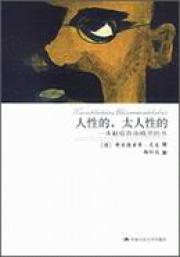1) rational humanism


理性人性观
1.
The historical development of constitutional philosophy depends on the basic effect on constitution of humanism, of which natural humanism breeds the bud of ancient constitution with "priority of rule by law", rational humanism conduces to the formation of modern constitution with "limited government", and social humanism sets off the development of modern constitution.
宪法价值哲学的历史形成和发展,离不开人性之于宪法的基础作用:自然人性观通过"法治优先论"孕育了古代宪法的萌芽;理性人性观以"有限政府论"促成了近代宪法的形成;社会人性观则以"社群主义论"激发了现代宪法的发展。
2) Management humanity concept


管理人性观
1.
Management humanity concept refers to the managers\' knowledge and evaluation of the staffs in the managing activities.
企业管理者的管理人性观是管理者在管理活动中对员工的认识和评价。
3) psychic character


"心理性"人物观
1.
From theories of functioning character and psychic character, this paper explores the necessity of Ophelia s existence in Shakespeare s Hamlet.
从“功能性”人物观来看 ,奥菲利娅成为“行动者”,在剧情推动方面起重要作用 ,不可或缺 ;从“心理性”人物观的角度来看 ,奥菲利娅不具有独特个性 ,她的存在性受到质
4) human nature view


人性观
1.
Analysis about human nature view of three kinds of psychological counseling theories;


试析三种心理辅导理论的人性观
2.
The human nature view is the foundation of psychological consultation research.


人性观是对人的基本看法和哲学假设,在心理咨询和资料中,人性观是一切方法和技术的理论基础。
3.
But they had entirely different value judgment about human nature view.


孔子与亚里士多德是中西方历史上最有影响力的两位思想巨匠,而二者对人性观却作出了截然不同的价值判断,这促使中西方文化形成了不同的价值取向,进而促使中西方法治发展走上了两条完全不同的路。
5) human nature


人性观
1.
Views of human nature and its related factor research of college students;


大学生人性观发展及相关因素
6) view of humanity


人性观
1.
The view of humanity is the basic viewpoint and philosophical hypothesis about human,the key to counseling and psychotherapy.
人性观是对人的基本看法和哲学假设,是心理咨询与治疗的基石。
2.
All psychological theories were based on certain view of humanity.


心理学理论或派别是以一定人性观为基础和前提的。
3.
In psychological counselling and therapy,the view of humanity is the theoretical foundation for all the approaches and techniques though different schools have different assumptions.
在心理咨询和治疗中,人性观是一切方法和技术的理论基础,不同学派有其不同的人性观假设。
补充资料:《人性的,太人性的:一本献给自由精灵的书》

《人性的,太人性的:一本献给自由精灵的书》
本书是为纪念伏尔泰逝世100周年而写,同时也出自作者对早年崇拜的音乐家瓦格纳的失望情绪。全书用格言体写成,分两卷。第一卷共九章,从各方面探讨了世界与人生的基本问题。第二卷的两个部分《见解与箴言杂录》和《漫游者和他的影子》,继续作者在第一卷中开始的对西方形而上学传统及其影响下的西方文化的全面批判。
作者一方面肯定人性中值得肯定的方面,希望挖掘人的潜力,使人类变得更优秀;另一方面又对人性的弱点和缺点,尤其对西方文化传统下形成的这种弱点和缺点,进行了尖刻的讽刺和挖苦。 作者寄希望于"自由精灵",也就是能超越传统思维方式、传统道德观念而自由思想的人。
本书作者弗里德里希•尼采(nietzsche, friedrich, 1844-1900)是19世纪德国哲学家,唯意志论和生命哲学主要代表之一,被认为是世界最伟大的思想家之一。早年在波恩大学和莱比锡大学学习,获博士学位。不到25岁就被聘为瑞士巴塞尔大学的古典语文学副教授,并在一年以后成为正教授。一生著述颇丰,如《悲剧的诞生》、《查拉图斯特拉如是说》、《善恶的彼岸》、《强力意志》等,对20世纪的思想界产生重大影响。1889年初,在意大利的都灵街头摔倒,就此精神错乱,于11年后在德国的魏玛去世。
说明:补充资料仅用于学习参考,请勿用于其它任何用途。